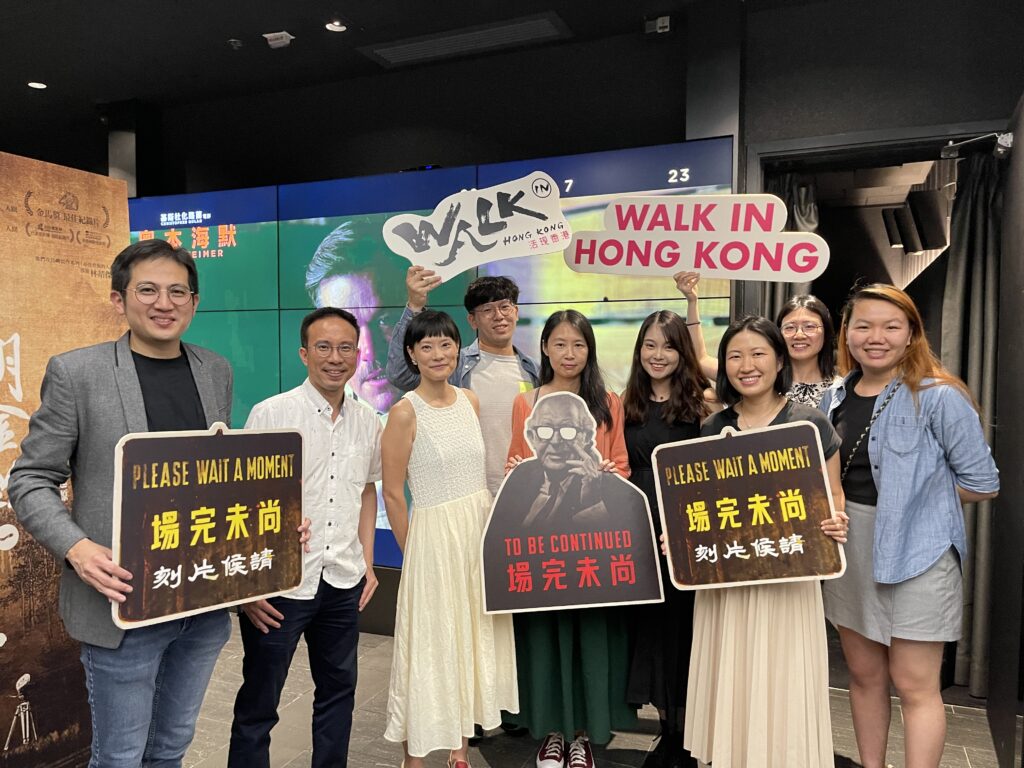In 2013, Walk in Hong Kong was established by a group of friends who had a passion for traveling. Their aim was to explore the cultural stories of their hometown and design engaging walking tours. Now, after ten years, we interviewed three of the co-founders to hear their reflections on the past decade and their aspirations for the future.
Walk in Hong Kong: W // Dora: D // Haider: H // Paul: P
W: Do you remember what your initial goal was when you founded Walk in Hong Kong ten years ago?
H: When I joined Walk in Hong Kong back in the day, one of the biggest draws for me was the opportunity to lead tours. It was fun and also allowed me to let my creativity flow. For instance, leading a tour in Wan Chai, I could share quirky and amusing stories, almost like performing on stage. A few years later, we started a conservation movement for the State Theatre, which offered an even greater platform to infuse our emotions and feelings for the theatre and the city of Hong Kong. This year, we even produced a film, which I feel takes our initial aspirations to a whole new level. We never imagined it would become such a significant endeavor!
P: Back then, I really wanted to do something related to travel, but I wasn’t sure what exactly. I simply enjoyed participating in walking tours, so I thought, why not create walking tours? In the beginning, it was an experimental format. At the start, I focused on areas and topics that I personally liked. The concept, significance, and ideas behind Walk in Hong Kong gradually became clearer over time.
Around the first or second year, we began to see our value: firstly, we emphasized storytelling; secondly, we aimed to connect with others, meet people, explore shops, and uncover lesser-known cultural stories; thirdly, we wanted to offer something intriguing to draw people in. It eventually evolved from just a business endeavor to creating a certain social impact. For instance, we aimed to offer unique travel experiences, contribute to conservation efforts, and even ventured into filmmaking.
D: I strongly resonate with the idea of uncovering Hong Kong’s cultural soft power as a whole city. Often, when you visit a city, you might only go once. However, when you find yourself wanting to return for a second or third time, it’s because of the unique qualities and deep-rooted cultural aspects that make you want to experience it over and over again. Starting Walk in Hong Kong was essentially about asking myself, what is Hong Kong’s local culture?
Our walking tours at Walk in Hong Kong go beyond just history; we emphasize a variety of cultural elements. We include aspects of daily life, such as cha chaan tengs (Hong Kong-style diners) and tea shops, using things you see in the present moment that are closely related to history.
For instance, we use tea shops to link back to the Opium Wars. What exactly triggered the Opium Wars? It’s not just opium! The Qing government’s trade of tea, silk, and other goods with England gradually turned into a severe trade imbalance, which is a significant underlying factor. Then, we would sit in a tea shop and drink tea while the master talks to you about the history of the tea canisters spanning decades and the calligraphy on them, which also connects to the broader history of Hong Kong’s development. I believe if tourists hear these stories, they will become more engaged and feel the unique charm of Hong Kong even more.
I never thought Walk in Hong Kong would evolve to the point of sponsoring films, covering various regions, collaborating with different entities, and even doing virtual tours. The potential for growth is immense. We hold onto our initial intention of showcasing Hong Kong’s culture. This began with our conservation efforts for the Emperor Theatre, and it extends beyond our walking tours. It’s about demonstrating our underlying philosophy: what truly makes Hong Kong special.
W: After ten years, do you all have any major plans you want to implement and what are your prospects for the future?
H: Over the past years, Walk in Hong Kong has participated in various projects, including movies, stage plays, concerts, and more. Some were planned in advance, while others happened opportunistically.
P: There are a few things I’m thinking about. First, we’ll have a summary of the Emperor Theatre project in 2026; second, we’ll consider the idea of passing down our legacy and defining Walk in Hong Kong’s position; third, we want to set benchmark for cultural tourism and design some training so that more people can excel in cultural tourism in Hong Kong.
D: I agree, especially in terms of culture and tourism, we can provide training so that everyone can improve. It’s not just about one organization but the whole industry, spreading the discovery of Hong Kong’s unique cultural traits. We are grateful that we have always enjoyed doing things we love or find interesting, and naturally, it attracts many people and brings about exciting projects. I have a belief that if what you do is genuine and good, you will naturally attract new partners. We should always remain open to opportunities.
Postscript
Walk in Hong Kong has embarked on numerous projects, big and small, and many of them were unforgettable experiences. In a future article, we will share some stories from Paul and our tour guides.

